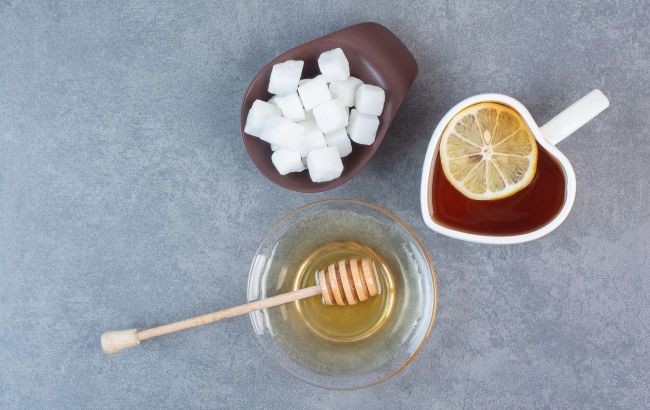Honey, sugar, or stevia: Dietitian's top pick revealed
 Can sugar be replaced with honey? (photo: Freepik)
Can sugar be replaced with honey? (photo: Freepik)
Many Ukrainians believe that replacing sugar with honey or sweeteners makes their diet healthier. But is it really good for the body? Ukrainian nutritionist Professor Oleh Shvets explained the hidden dangers in the most modern sugar substitutes, including honey.
Sugar: Main enemy of weight and teeth
The nutritionist highlights two key negative effects of excessive sugar consumption.
First, body weight. The body easily converts excess sugar into fat stores.
Second, the risk of cavities. People who regularly consume a lot of sugar are much more likely to experience this common problem.
Therefore, limiting sugar in the diet is a necessity, not just a trend. But is there a solution through substitution?
Honey is not a panacea
Many people consider honey a healthy sugar substitute. However, according to the expert, this is a misconception.
"Replacing sugar with honey is nothing because it is essentially the same as regular sugar," he says.
In terms of chemical structure and its impact on calorie intake, these products are almost identical. Although honey contains a small amount of vitamins, its benefits are offset by the high glucose and fructose content.
However, honey remains popular during the cold season when added to tea, with lemon, or "for an immune boost." However, as the nutritionist emphasizes, the benefits of honey do not outweigh the risks of overconsumption.
What's wrong with sugar substitutes
The situation is even worse with artificial sweeteners, which have become extremely popular. Although they contain fewer calories, their effects on the body may be unfavorable.
Shvets points out two critical risks. First, artificial sweeteners have adverse effects on the gut microbiome.
Second, according to the expert, new research revealed that most artificial sweeteners can negatively impact brain function.
These are significant reasons to think twice before buying products labeled sugar-free.
An exception may be stevia, a natural plant-based sweetener. However, even here, the expert says that additional research is needed to make conclusions about its safety with long-term use.
How much sugar can you eat?
Even if you enjoy sweets, there is no need to eliminate them all. The recommended amount of sugar (including honey) is about 25 grams, which is safe, so there is no need to avoid it entirely if you can control the quantity.
If you drink tea with honey during the cold season, remember that it counts as calories. However, within the recommended 25 grams, it is acceptable (25 grams of sugar is roughly one heaping tablespoon of sugar or five level teaspoons, according to WHO guidelines).
The professor adds that although he knows people who have eliminated all sugar—and that is fine—it does not mean they have become completely healthy just from this change. Healthy eating is a holistic approach, not just the exclusion of one food group.
This material is for informational purposes only and should not be used for medical diagnosis or self-treatment. Our goal is to provide readers with accurate information about symptoms, causes, and methods of detecting diseases. RBС-Ukraine is not responsible for any diagnoses that readers may make based on materials from the resource. We do not recommend self-treatment and advise consulting a doctor in case of any health concerns.

